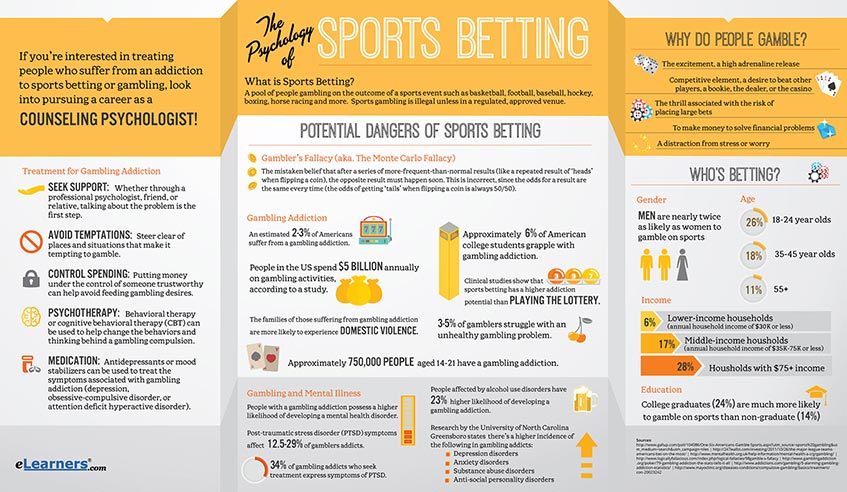Chances are you’ve been around people betting on sports or may have even placed a bet yourself! Sports betting can be as harmless as a being part of a playoff game pool at work or playing the odds of a horse race. We get excited from the risk of betting and possibly losing our hard earned money, and sometimes the payoff is thrilling! There’s the monetary upside to sports betting but there can also be a danger when—for some people—sports betting turns into a gambling addiction.
First of all, what is sports betting? Well, it’s basically a pool of people gambling on the outcome of a sports event—a boxing match, the Super Bowl, basketball playoffs, horse racing—and the bets are typically dictated by the odds calculated from how many times that athlete or team has won or lost.
Keep in mind that outside of regulated, approved venues, sports betting is illegal. That doesn’t necessarily mean that the police will bust down your door to haul you in for your hockey playoff pool with friends. But people who run underground gambling groups might be subjected to criminal prosecution. (Continue reading after the infographic)
Want to share this image on your site? Just copy and paste the embed code below:
If you made a bet that men are more likely to participate on sports betting than women, you’d win! Men are twice as likely as women to gamble on sports. The age range with the highest percentage of gamblers is 18-24 year olds (26% of reported gamblers), followed by 35-45 year olds (18%), and gamblers aged 55 and older (11%). Another interesting statistic is that college graduates are 24% more likely to gamble on sports than people who don’t have a college degree. Perhaps it has to do with college graduate typically earning more with a degree[i] and that translates to more expendable income with which to bet.
People bet for a few different reasons. The risk of betting produces adrenaline in the body and the payoff of money could mean taking a great vacation or settling financial debt. Sometimes gambling can distract someone from worries, or it can bring out their competitive spirit in their desire to beat other players, the dealer, or the casino itself. While the thrill can be great, some people become addicted to the rush that comes with the risk associated with a bet. An estimated 2 to 3% of Americans suffer from a gambling addiction and 6% of American college students are said to be grappling with this addiction. People with a gambling addition have a higher likelihood of developing a mental health disorder, and unfortunately, families of those suffering from gambling addiction are more likely to experience domestic violence. Clinical studies show that sports betting has higher addiction potential than playing the lottery, so if your grandmother buys a lottery ticket every afternoon, it doesn’t necessarily mean she has a gambling addiction. With the University of North Carolina Greensboro’s research connecting a higher incidence of some mental health disorders (like depression, anxiety, and substance abuse disorders) in those who suffer from gambling addiction, it’s important to recognize this problem in ourselves and in others to avoid the possible damage it can cause.
Once an addiction to sports or casino betting has been identified by the individual or their family members, it is a good idea to seek out treatment. Getting treatment might mean seeking support through a professional psychologist or counselor, or through a friend or family member. Discussing the problem could be the first step towards someone’s recovery. Steering clear of places and situations where sports gambling takes place can be a good idea. A popular treatment of gambling addiction is cognitive behavioral therapy (CBT), which is administered by a therapist. It’s a form of treatment that has the potential to help gambling addicts, as the aim is to change the thoughts that compel someone to gamble compulsively and attempts to send those thoughts on a different path. Medication prescribed by a psychiatrist may also be a good way to curb compulsive gambling and the depression that can come with it.
If you’re interested in learning more about what turns an occasional sports bet into a gambling addiction, as well as the treatment that goes along with battling that addiction, consider pursuing a career in psychology or counseling psychology. Psychology is a fascinating field for the inquisitive mind to enter into—that you can bet on!

